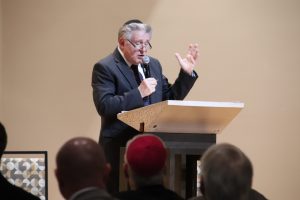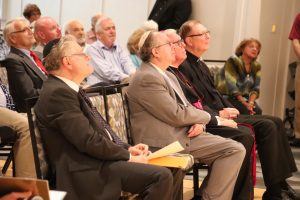A friendship lasting a quarter-century finds its roots in the Second Vatican Council Declaration Nostrae Aetate (On the Relation of the Church to Non-Christian Religions), the important document that called for a fresh and positive relationship between the Catholic and Jewish Faiths.
 Rabbi Abraham Skorka and Pope Francis have served as examples of friendship and interreligious dialogue because they have lived out the call of Nostrae Aetate which acknowledges the Church’s bond with the Jewish people.
Rabbi Abraham Skorka and Pope Francis have served as examples of friendship and interreligious dialogue because they have lived out the call of Nostrae Aetate which acknowledges the Church’s bond with the Jewish people.
Rabbi Skorka was the keynote speaker at the April 3, 2022, gathering of the Catholic-Jewish Dialogue of Collier County at St. John the Evangelist Parish in Naples. The presentation was co-sponsored by the Diocese of Venice and Jewish Federation of Greater Naples.
“One of the values I learned from my parents and grandparents was that speech between peoples should reflect the way that people ought to relate to each other with moderation, sincerity and honesty,” Rabbi Skorka explained, noting that the friendship with Pope Francis began as an open exchange of ideas with then Archbishop Jorge Bergoglio of the Archdiocese of Buenos Aires. Rabbi Skorka was the leading Rabbi in Argentina as Rector of the Seminario Rabínico Latinoamericano (Latin American Rabbinical Seminary), in Buenos Aires.
The Rabbi explained that the Holocaust, and its lasting impacts, was a reality that marked his being since childhood.
“The travails of the Jewish people took palpable form in my family which was decimated by the massacre (of the Holocaust). It was not merely historical fact as a Jew I should remember; what stays with me was the sadness which overwhelmed the members of my family and the many members of the community in which I was a part. The Shoah and anti-Semitism were not simply recounted to me; it was an experience that also shaped me by being imparted by many who suffered in their native Europe.”
When he began his rabbinical studies, Rabbi Skorka learned a great deal about Nostrae Aetate, which was released in 1965 by St. John XIII. While the document was short, it served as a profound and absolute apology for years of divisiveness between the Catholic and Jewish faiths.
Inspired by the knowledge and understanding that no religion is an island, Rabbi Skorka openly wrote about the need for interfaith dialogue. One such article brought the Rabbi and Archbishop into contact, forming a lasting bond centered on the belief that the only way to overcome hatred was through the encounter of the members of different religions and cultures.
The Rabbi went on to say that Pope Francis has a profound ability to identify with the Jewish experience. This was evident in his instinctive understanding from the very beginning that dialogue between Catholics and Jews would become untenable if Catholics harbored any thought of “converting” Jews to Jesus Christ.
 Bishop Frank J. Dewane also addressed the Catholic-Jewish Dialogue gathering, talking about the noble mission of the group.
Bishop Frank J. Dewane also addressed the Catholic-Jewish Dialogue gathering, talking about the noble mission of the group.
Bishop Dewane said that the advancement of Catholic-Jewish relations comes directly from Nostrae Aetate, which should be celebrated. The document changed the landscape of the Church and was done with prudence and love, started a completely new conversation within the Catholic Church.
This new moment in the Church’s history had its roots in a renewed study of Hebrew and Christian Scripture and other theological developments that had occurred at the Second Vatican Council.
Bishop Dewane explained how Pope John Paul II led a revolution that transformed relations between the Catholic Church and the Jewish people. Pope John Paul II was the first Pope to visit a Jewish synagogue and the Western Wall. He then established diplomatic relations with Israel, applying the term “beloved elder brothers” when referring to the Jews.”
The Bishop explained that the development of Nostrae Aetate’s principle themes reshaped specific expression of Catholic Teaching, which had posed obstacles to Jewish-Catholic relations.
“The long road ahead is marked by our two communities of faith in a relatively short time since the Second Vatican Council and has yielded immense fruit and I believe there are practical ways in which we can build on these developments,” Bishop Dewane continued. “We need to share our concerns on an increasingly hostile culture and especially a growing antagonism toward people of faith… We can find a common purpose in standing up against these acts as people of faith… Any one act against faith is too much. We all need to speak up, each one within our tradition, within our faith perspective. In this environment we face today we must also see increased positive collaboration to deepen friendships as we moved forward together.”
Michael Feldman, member of the Catholic Jewish-Dialogue served as the program emcee. Other speakers included Rabbi Frank Muller, Father Bob Kantor of St. Agnes Parish, as well as Catholic-Jewish Dialogue Co-Chairs Luba Rotsztain and Martin Gauthier.





